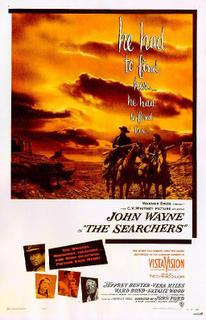The Searchers

One of the most melodramatic, melancholy westerns ever, this came in the latter half of John Ford and John Wayne's careers. After making a living (and a legacy) directing and starring in westerns, respectively, often working with each other, the two collaborated here to create a deconstruction of the Western myth. John Wayne's Ethan Edwards is no different from many of his other characters: a natrual born leader, war hero, gunslinger, tough, brave, but also an outcast. This is where John Ford dared to break new ground. Ethan Edwards is such a similar character, yet so strikingly different. His family is scared and confused by him: he disappears for years at time, is indiscriminately violent and malevolent towards Native Americans (this in itself is a key difference from many Ford and Wayne films, where Native Americans were often portrayed in a more sympathetic light, mostly because Ford forged friendships with many tribes, using them as extras and on his crews for many years), and his titular mission of finding his missing niece borders on an unhealthy obsession. Many of the John Ford elements are on display here as well, including: spectacular Monument Valley landscapes, Ward Bond's presence, and an overarching theme of family and reunion, but still, the character of Ethan Edwards dominates the entire proceedings.
After returning to his brother's family's ranch, several years after the end of the Civil War, in which time it is alluded to that Ethan had been doing mercenary work, Ethan finds himself alienated from his brother and sister-in-law, whom he secretly loves. Shortly after his return the family is massacred by a Comanche war party and the youngest of the children, Ethan's niece Debbie, is kidnapped by the tribe. Ethan vows to find her and bring her back, and the man who loves her, half-breed half-brother Martin, pledges his service to his "uncle" Ethan. Ethan is an extremely complicated man however, he resents Martin's mere presence (owing to the Indian blood which runs through his veins), and a simple (in theory) resuce mission becomes a five year obsession, in which Ethan searches virtually every inch of the American South West, before taking his crusade into Mexico. Never really going on much more than hearsay and hunches, Ethan soon fixates his vengeance on the figure of Scar, the war chief of the Comanche tribe that took Debbie and killed his brother's family. Throughout their search Ethan's behavior becomes incresingly violent (he ruthlessly shoots as many buffalo as he can in the hopes of starving as many Comanche as he can), and Martin becomes increasingly concerned that Ethan intends to kill Debbie upon finding her, since she undoubtedly would have been "corrupted" by her time spent with the Comanche. Finally, after tracking Scar deep into Mexico, Ethan and Martin find Debbie, resulting in a climactic chase where Martin valiantly puts himself in the way of Debbie and the wrathful Ethan. Humanity wins Ethan over though, as he cannot bring himself to kill his niece and the trio somberly returns to the ranching community where they set out from so many years ago.
The reunion now intact, one would think that John Ford would be content to let the film play out "into the sunset", with the happy couple reunited, Ethan redeemed, etc, but instead, keeping with Ethan's ambiguous character and the film's tonal deconstruction of the western mythology, the film ends with Ethan perhaps even more of an outcast than he was when the film began. As the film ends Ethan slips out from the party and steps through the front door in one of the most iconic shots in cinema history. The void between him and his reunited family is dramatically portrayed in the space of a few feet as he steps out from the festive atmosphere in the house to the bright, wide open spaces before him of Monument Valley. Ethan pauses for a moment by the front door, clutches his arm (in a nod to his late friend Harry Carey), then continues on, leaving behind the family he spent five years of brutal searching to reunite. The statement is grim but bold, Ethan has no place in a happy family. This is not the family's fault, he simply is filled with too much hatred and too much vengeance to ever be contented with a normal happy life of settling down and farming. Whereas John Wayne's characters usually end up happily in the arms of a young lady, the town villain dead, Ethan Edwards returns to the wilderness, to the roaming expanses of the southwestern desert, where he truly is home. This film is the first of the John Ford/John Wayne reflective, deconstructionist westerns they would make in the later 1950's and into the 1960's; among others are "The Man Who Shot Liberty Valance", "Cheyenne Autumn" and "How the West Was Won". All are exceptional, especially considering their contrast to the gung-ho, jingoistic Westerns they two had become famous for, and this sentiment of their "need to tell the real story of the West" is brilliantly realized in that stunning final shot.

0 Comments:
Post a Comment
<< Home